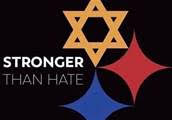After Pittsburgh? (November 2018)

The day after the attack on the Tree of Life congregation on Saturday, some of you heard me say that I had no words of wisdom to bring meaning from the chaos. That remains the case. I have no answers, only questions, hence the question mark in the title of this piece. Yet how can I write about anything else, as the stories of the victims emerge and as the process of laying them to rest has begun? As the Times reported, “This week, in the close-knit Jewish community of Pittsburgh, there will be many overlapping shivas.”
Just over a year ago, in August 2017, Charlottesville happened, and everything changed, for American Jews and for America. Things have changed once again, tragically, and they are going from bad to worse. And not just to Jews, but to this entire country. As Tree of Life’s rabbi, Rabbi Jeffrey Myers, stated, the attack was “an attack on America… When American citizens cannot freely and safely worship in their house of worship and celebrate the Sabbath, it challenges the safety and security of all Americans in any house of worship.”
The Tree of Life attack has been called the worst anti-Semitic incident in American history. It was by no means the first attack against a Jewish institution in modern times. Since 1999 there have been four other attacks at JCC’s, Federations, and even the U.S. Holocaust Museum. But the Tree of Life attack destroyed more lives that all of those combined.
Anti-Semitism, "the longest hatred," has existed in various forms almost as long as the Jewish People has been around. It had been relatively dormant for many years, at least in the U.S., but there has been a significant rise in anti-Semitic incidents in the past few years. The ADL, which monitors anti-Semitic incidents around the country, reported a 57% increase nationwide in such incidents from 2016 to 2017, the biggest increase since 1979.
Along with anti-Semitism, hate crimes are also up around the country. The Tree of Life deadly shooting was a hate crime, but not the only one last week. Two African-Americans were targeted and murdered at a grocery store in Kentucky. This is a reminder that most people who hate Jews also hate Blacks, Muslims, LGBT people, other minorities, and increasingly, due to our political climate, immigrants. In other words, anyone who is different from the white majority. Let us remember the June 2015 attack at the Emanuel African Methodist Episcopal Church in Charleston, South Carolina, by white supremacist Dylann Roof, killing nine members of that church, as well as countless other attacks directed against Black churches, especially throughout the South.
Sadly, it seems that we have become inured to mass shootings. Schools, churches, offices, concerts, now a synagogue. And we cannot forget what else happened last week—the mailing of pipe bombs to 14 people (that we know of), all Democrats and/or critics of President Trump. As an article in Foreign Affairs describes, the terrorist threat has evolved. Radical jihadists are no longer the biggest threat, but rather radicalized individuals.
After Pittsburgh, everything has changed. As Jeff Jacoby, a Jewish opinion writer for the Boston Globe,wrote yesterday, Saturday’s attack reflects our changing America. He laments that the America he grew up in—as well as so many of us of a certain age—is gone. In that America, “Jews had nothing to fear from their neighbors. Unlike my father — a Holocaust survivor who immigrated to the United States in 1948 — I was reared in a culture where overt anti-Semitism was generally anathema, and where Jew-haters on the far left and far right kept their poisonous ideas mostly to themselves. The Nazi genocide had so traumatized the West that anti-Jewish bigotry became repugnant in mainstream society. Having seen what can happen when anti-Semitism is indulged, the civilized world recoiled from it. In the America I grew up in, Jews not only lived in relative peace and harmony, but assumed that peace and harmony would go on indefinitely.”
We may need to say Kaddish for that America. We may need, as he suggests, to “harden our synagogues” and other Jewish institutions. Jewish communities around the world already know this and have been doing so for years. It may be time for us to do so as well. That discussion is already taking place in our community; we will keep you posted.
I opened with a “Stronger than hate” logo that is an adaptation of the Pittsburgh Steelers logo, and I close with the words of Rabbi Sharon Cohen Anisfeld, President of Hebrew College in Newton: “We will not let those whose hearts are filled with hatred tear the fabric of our communities and our country apart. We will lift each other up and hold each other by the hand."
date this content.
